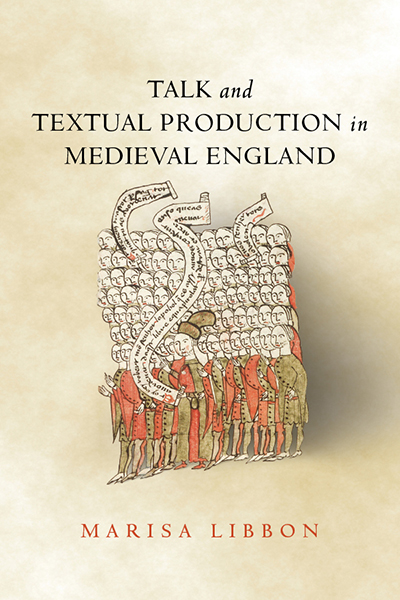Talk and textual production in medieval England
People in medieval England talked, and yet we seldom talk or write about their talk. People conversed not within literary texts, but in the world in which those texts were composed and copied. The absence of such talk from our record of the medieval past is strange. Its absence from our formulation of medieval literary history is stranger still. In Talk and Textual Production in Medieval England, Marisa Libbon argues that talk among medieval England’s public, especially talk about history and identity, was essential to the production of texts and was a fundamental part of the transmission and reception of literature. Examining Richard I’s life as an exemplary subject of medieval England’s class-crossing talk about the past, Libbon advances a theory of how talk circulates history, identity, and cultural memory over time. By identifying sites of local talk about England’s past, from law courts to palace chambers, and tracing rumors about Richard that circulated during his life and long after his death, Libbon offers a literary history of Richard that accounts for the spaces between and around extant manuscript copies of Middle English romances like Richard Coeur de Lion, insular and Continental chronicles, and chansons de geste with figures such as Charlemagne and Roland. These spaces, usually dismissed as silent, tell us about the processes of writing and reading and illuminate the intangible daily life in which textual production occurred. In revealing the pressures that talk about the past exerted on textual production, this bookrelocates the power of making culture and collective memory to a wider, collaborative authorship in medieval England.
zum Buch im ULB-KatalogPlus
zum Buch auf der Verlags-Website
Literature and class: from the peasants‘ revolt to the French Revolution
This book explores the intimate relationship between literature and class in England (and later Britain) from the Peasants‘ Revolt at the end of the fourteenth century to the impact of the French Revolution at the end of the eighteenth century and beginning of the nineteenth. The book argues throughout that class cannot be seen as a modern phenomenon that occurred after the Industrial revolution but that class divisions and relations have always structured societies and that it makes sense to assume a historical continuity. The book explores a number of themes relating to class: class consciousness; class conflict; commercialisation; servitude; rebellion; gender relations; and colonisation. After outlining the history of class relations, five chapters explore the ways in which social class consciously and unconsciously influenced a series of writers: Chaucer, Shakespeare, Behn, Rochester, Defoe, Duck, Richardson, Burney, Blake and Wordsworth.
zum Buch im ULB-KatalogPlus
zum Buch auf der Verlags-Website
Weitere Titel können Sie in unseren Neuerwerbungslisten für die Anglistik entdecken!
